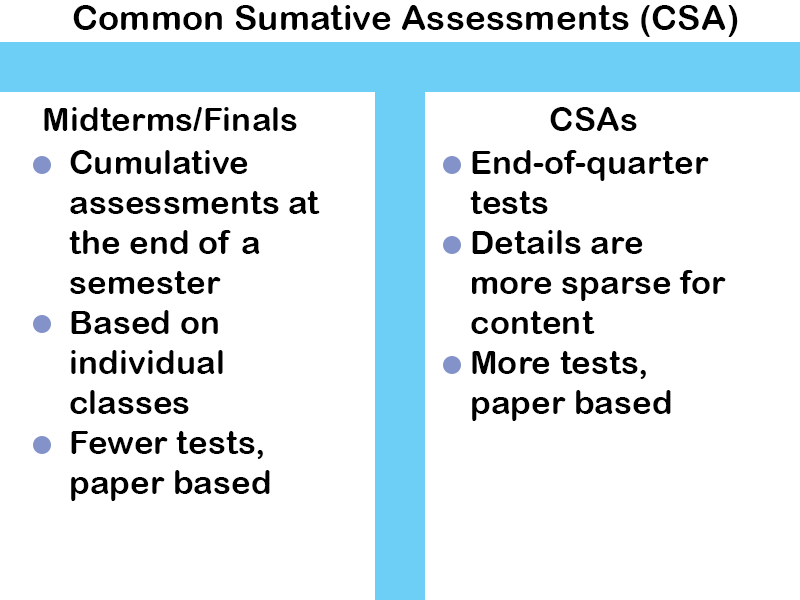By Olivia Richie
Common Summative Assessments (CSA) started on the state level, these essentially are smaller tests used to test students on topics throughout the year. Instead of one huge test like midterms they are smaller tests given each quarter. This year CSAs are going to be used on the district level by getting rid of midterms. Ponte Vedra High School (PVHS) will be taking three short tests each quarter (CSAs) in their core classes and then taking the final at the end of the year. While the information of CSAs is very limited because it’s the first year these assessments will be used this way and have yet to be taken, it’s important to understand what is known as of now.
As of right now, CSAs are meant to be used as a progress monitoring tool for teachers. The CSAs apply to every core class such as Math, Science, and English. Continuing, CSAs do not apply for classes that have a state issued test. For example, ninth and tenth grade English classes do not have CSAs because they have the Florida Assessment of Student Thinking (FAST). This new testing policy is meant to display less testing, however putting it on a paper you see more testing with the CSAs. Which begs the question will these tests truly be beneficial for students and teachers? “While the overall goal is meant to help teachers teach better and to help students learn better, these tests to a degree may cause more stress on teachers because it’s just another thing teachers will have to adjust too,” said Caitlin Healy the testing coordinator at PVHS.
The most interesting part is how much teachers don’t know about these tests. “The English department has not seen CSAs before; the department hasn’t really heard much about them either. Except that they’re happening,” says Jodi Rolison an English Honors and Dual Enrollment teacher at PVHS. Another concern about these tests is not only how little we know about them, but also how students will perform on these tests and how serious they will be taken. “I’m concerned specifically for Seniors that this testing will not be taken as seriously because these tests hold teachers more accountable than the students. These tests have very little effect on students,” said Mrs. Rolison. When it comes down to it, some students are good test takers, and some aren’t.
So, are more standardized tests really going to help students understand the material? Or help teachers teach the material? “I don’t love standardized tests. We’ve been told to individualize material to help every student understand the material, but I don’t see how that can be done with just more standardized tests. I also don’t see how the CSAs will help with that problem. I think it’s just another way for the district and the state to micromanage the classroom,” said Evan Ore an American Government Honors and Economics teacher at PVHS. This point of view is held amongst many teachers because of how impractical it is for students going on to college. The standards being tested on in tests such as the CSA, rarely bleed through to college standards. College professors make their own regiments, lessons, and tests. By having more tests like the CSAs, it limits educators’ creative freedom in teaching their students.
While it’s the first time CSAs will be used on the district level they have been used before by teachers like Kaitlyn Parker. “We’ve been using CSAs for some time now actually, but only on the PLC level (Professional Learning Community) our chemistry team have used CSAs before, and they have been very useful to the teachers. They allow students to be tested on smaller portions of the material which has helped myself and other teachers in understanding what are students need,” said Kaitlyn Parker a Chemistry and Marine Biology teacher at PVHS. The PCL refers to teachers who teach the same subject who then collaborate for teaching certain material. Such as the Chemistry team at PVHS.





